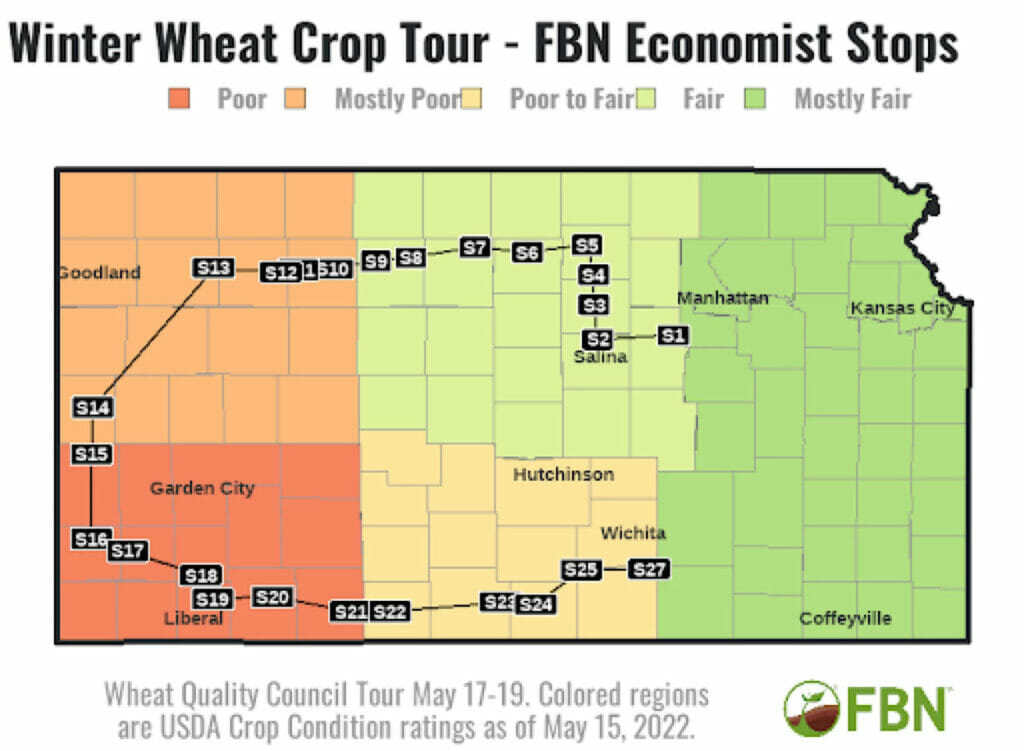Kansas, the largest producer of wheat in the United States, has been plagued with major drought that has caused dead and barren fields, which are set to cause even greater food shortages and prices in the months to come.
The U.S. is the 5th largest producer in the world. Russia is the largest.
The drought has been so bad farmers ‘are intentionally spraying wheat fields with crop-killing chemicals and claiming insurance payouts more than normal, betting the grain is not worth harvesting,’ Reuters reported via Successful Farming, yesterday after some correspondents with the outlet documented. Some farmers are now overturing their dead wheat fields so the cattle graze them.
‘Nationally, winter-wheat farmers plan to abandon 33% of the acres they planted, the highest percentage since World War I, the U.S. Department of Agriculture said in a May 12 report,’ the outlet added.
Reuters also added: ‘Parts of Oklahoma are suffering too. In six northern counties, an estimated 65% to 70% of the crop will not be harvested, said Mike Schulte, executive director of the Oklahoma Wheat Commission.’
The Kansas Wheat association reported on the 18th, “Abandoned fields and low yields underscore Wheat Tour 2023.” They wrote:
The three-day average calculated yield for the fields that will be harvested was 30 bushels per acre.
While an estimated 8.1 million acres of wheat were planted in the fall, the Kansas wheat crop has suffered from a multi-year drought, which has robbed the state’s yield potential and resulted in many abandoned fields.
The official tour projection for total production of wheat to be harvested in Kansas is 178 million bushels, indicating that tour participants thought abandonment might be quite a bit higher than normal at 26.75%. The production number is the average of estimated predictions from tour participants who gathered information from 652 fields across the state. Based on May 1 conditions, NASS predicted the crop to be higher at 191 million bushels, with a yield of 29 bushels per acre and abandonment at 18.5%.
In a statement to Brownfield Ag News, Western Kansas farmer Jim Sipes says he’s abandoned 4,000 acres of his winter wheat crop due to on-going drought, and how he never recovered from the previous year of extreme drought and heat.
All of our wheat for the first time in my farming career was a complete loss, zeroed out on appraisal about four weeks ago.
We’re needing to do something to cover the ground. Right now, we’re looking at grain sorghum as an option. It’s not a real good option because I know I need two full crops to make my operation work.
Furthermore, High Plains Public Radio reported that these problems began to brew in 2022: ‘Even with wheat selling for near-record-high prices as the war in Ukraine disrupts the world’s food supplies, a lot of farmers in western Kansas won’t have any to sell. And those who made it through the drought with enough crop to harvest will likely end up with far fewer bushels than they had last year, a downturn that limits the state’s ability to help ease the global food crisis.’
Farmer Vance Ehmke said, “There’s nothing out there. It’s dead,” and “It’s just ankle-high straw.” While Ehmke still has some optimism that some parts of the field will still produce, he may still only yield half of what his farm did in 2021.
They’re losing money, even with the highest price of wheat that we’ve probably ever seen in the past 50 or 100 years.
Ehmke said, referring to the other farmers who are not as fortunate
Things like the rising prices of diesel fuel, and fertilizer price hikes and shortages, with the Russia-Ukraine war and international restrictions causing a logistics nightmare for importers and farmers globally.
It’ll be a very difficult year. Just because commodity prices are high, it does not mean that producers are better off.
It was so dry, the grass on the side of the road was dead. And that’s weeds.
Rejeana Gvillo with Farmers Business Network said.

But it’s not just the drought that caused these problems, but high winds, hail, and an assortment of factors led to the wheat to not grow sufficiently.
The Radio reported: ‘There was the December 15th, [2021], storm that battered the region with widespread wildfires, hurricane-force wind gusts and swirling clouds of dirt that zapped crops with static electricity and evoked images of the Dust Bowl. This spring, extreme weather has continued to damage some wheat stands with hail, above-average winds and freezing temperatures. Then there’s the months-long drought that continues to ring the region dry of what little moisture it has,’ the station wrote.
But praying for rain won’t help as rain would just increase the chances of disease and fungus.
AUTHOR COMMENTARY
A little over a year ago when the Russia-Ukraine conflict broke loose I reported on the immediate effects it was causing, that would cause massive food shortages and famine in the years to come, especially considering the West refuses to reach a peace deal (intentionally).
But the whole world was getting hit with drought, dearth, flooding, and lower yields. All of this is culminating to much larger famine and much higher prices on commodities. I suspect we will REALLY see a lot of these issues manifest in 2024 and 2025, though already it is being felt throughout the world.
With all that is going on in the world, the judgment of the Lord continues to worsen.
[1] Then said the LORD unto me, Though Moses and Samuel stood before me, yet my mind could not be toward this people: cast them out of my sight, and let them go forth. [2] And it shall come to pass, if they say unto thee, Whither shall we go forth? then thou shalt tell them, Thus saith the LORD; Such as are for death, to death; and such as are for the sword, to the sword; and such as are for the famine, to the famine; and such as are for the captivity, to the captivity. Jeremiah 15:1-2
[7] Who goeth a warfare any time at his own charges? who planteth a vineyard, and eateth not of the fruit thereof? or who feedeth a flock, and eateth not of the milk of the flock? [8] Say I these things as a man? or saith not the law the same also? [9] For it is written in the law of Moses, Thou shalt not muzzle the mouth of the ox that treadeth out the corn. Doth God take care for oxen? [10] Or saith he it altogether for our sakes? For our sakes, no doubt, this is written: that he that ploweth should plow in hope; and that he that thresheth in hope should be partaker of his hope. (1 Corinthians 9:7-10).
The WinePress needs your support! If God has laid it on your heart to want to contribute, please prayerfully consider donating to this ministry. If you cannot gift a monetary donation, then please donate your fervent prayers to keep this ministry going! Thank you and may God bless you.








10 And he said, What hast thou done? the voice of thy brother’s blood crieth unto me from the ground.
11 And now art thou cursed from the earth, which hath opened her mouth to receive thy brother’s blood from thy hand;
12 When thou tillest the ground, it shall not henceforth yield unto thee her strength; a fugitive and a vagabond shalt thou be in the earth.
Genesis 4:10-12
Consider all the millions of innocent unborn babies torturously murdered through ABORTION as well as other murders of the innocent! Their blood cries out to Him, and now crops and farming will have huge problems yielding and harvesting any food in America!
its really scary hearing God talk like that in Jeremiah 15:1-2 but i understand its because of how they sinned and even though we in this dispensation are under grace its made clear not to take God’s grace for granted or grieve it or take advantage of him.
6 And ye shall hear of wars and rumours of wars: see that ye be not troubled: for all these things must come to pass, but the end is not yet. 7 For nation shall rise against nation, and kingdom against kingdom: and there shall be famines, and pestilences, and earthquakes, in divers places.
8 All these are the beginning of sorrows. Matthew 24:6-8